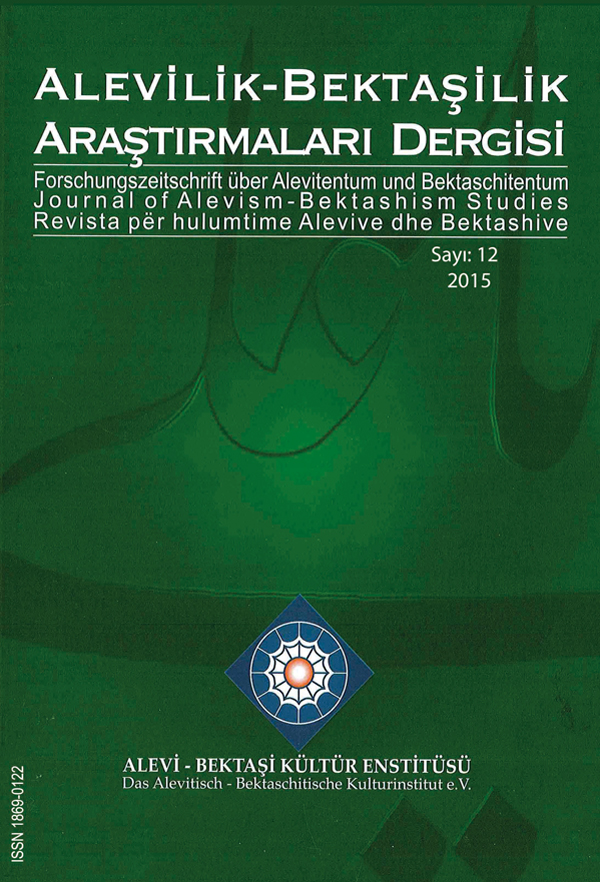Misinterpretation Of The Name “Bâyezid” in Faith And in Cultural And Historical Background
DOI:
https://doi.org/10.24082/abked.2015.12.004Keywords:
Bâyezîd, Kizilbash, Ottoman, Arabic and Persian LanguageAbstract
The people evaluating “Bâyezid”, commonly known as the names of Sultans’ sons in Ottoman State, within the frame of Alevi and Bektashi faith thinks that it is an attitude of Ottoman dynasty that comes out against Alevi and Bektashi faith; therefore, it is important to discuss the meaning of “Bâyezid” and why it is given as a name to the men from dynasty. “Yezid” is an infamous name because of Yezid bin Muaviye who martyrized Hz. Hüseyin in Karbala. In Turkish, the word Yezid is used with its meanings; “high-handed, merciless, cheater, impostor”. And also Turkish people use that name for “the one that is hated”. Ottoman Empire name their enemies as Yezid. At Yıldırım Bayezid and Timur struggle, Timur is identified as Yezid while Ottomans as prophet’s descendants. Some writers make similar metaphors. In historical sources, Yezid is generally described as the representative of cruelty and oppressors. For instance, the poet Mehmed uses “le’anehu’llah” that means “God curse him” in every line that includes the word Yezid. The writers like Hadidî, Şani-zâde Mehmet Ata’ullah Efendi, Evliya Çelebi attach offensive adjectives such as “dirty, villianious, ignorant, dreadful, junub, cursed, canine”. Artillery clerk, Abdulkadir Efendi uses the expression “küffâr-ı Yezidân” that means “infidelity”. It is easily understood that the Word Yezid has a negative meaning in both historical sources and sources at the present time. The situation is different in naming Ottoman Emperors. If the appendix “bâ-“ in the word Bâyezid is thought “father/ancestor”, then Bâyezid means “Yezid’s father/ancestor”. The transformation in the name of Bâyezid-i Bistamî, whose real name is Ebû Yezid Tayfûr b. İsa b. Sürûşan, is explained through its common usage in colloquial language. Accordingly, it is broadly accepted the word “Bâ-yezid” is different writing version of the word “Ebû-yezid” but has the same meaning. Ottomans is commonly defined themselves as the leader of Islamic World and with their loyalty to Ahl al-bayt. Considering the negative meaning of the word Yezid, it is impossible for Ottomans to give that name to their sons. The connection between the appendix “bâ-“ and the name “ebû” remains weak in terms of meaning. Considering Ottomans’ beliefs, thoughts and ideas, it requires that the word “Bâ-yezid” means “anti-Yezid”. That meaning has a religious content and also basically it should be related to the “oppressor” meaning of the word “Yezid”. Conquests policy and emphasis of justice are at the forefront in the periods of Murad I and Mehmed II who gave their sons the name Bayezid. Additionally, it is important that Alevi (Safevid Kizilbash) did not pose a problem in the periods of I. Murad and II. Mehmed. Ottomans in the period of Murat I carry out a public protection policy against powerful Turkmen Beylics like Germiyans and they give priority to the justice principles. In any case, justice principle against cruelty is an obligation and also a necessity for the Ottomans who believe in Islam. They have published warrant of justice for this purpose. Considering that emphasis upon justice emperors attach Persian appendix “bâ” which means “opposite/contradiction” to the word Yezid that is associated with “cruelty/oppressor”. By this way, they empower justice point and the meaning of “Bâyezid” transforms into a positive meaning; “kind, fair”. Consequently, it is obvious that Bâyezid contains a meaning that refers to “the one who is against cruelty and opressor” or “fair-minded” regardless of its origins.
Downloads
Downloads
Published
How to Cite
Issue
Section
License
Copyright (c) 2015 Journal of Alevism-Bektashism Studies

This work is licensed under a Creative Commons Attribution-NonCommercial-NoDerivatives 4.0 International License.








